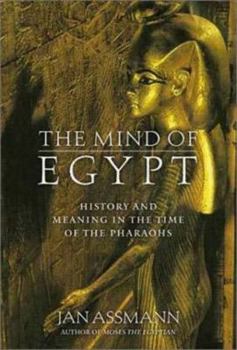The Mind of Egypt: History and Meaning in the Time of the Pharaohs
Select Format
Select Condition 
Book Overview
The Mind of Egypt presents an account of the mainsprings of Egyptian civilization - the ideals, values, mentalities, belief systems and aspirations that shaped the first territorial state in human... This description may be from another edition of this product.
Format:Hardcover
Language:English
ISBN:0805054626
ISBN13:9780805054620
Release Date:April 2002
Publisher:Metropolitan Books
Length:512 Pages
Weight:2.00 lbs.
Dimensions:1.6" x 6.6" x 9.5"
Related Subjects
Africa Ancient Egypt Europe Historical Study & Educational Resources Historiography History Middle EastCustomer Reviews
3 ratings
Deeply Theoretical
Published by Thriftbooks.com User , 14 years ago
Assmann is very theoretical but offers many different ways at looking at Anicent Egypt. His writing centers around memory in Egypt, since it Ancient Egypt really didn't follow a time line. This very indepth book and not a light read, but good none the less.
Great book
Published by Thriftbooks.com User , 18 years ago
It is hard to imagine how transient and fleeting our civilization is. A hundred years has seen a shift from the Sand Creek massacre, where Christian priests were scalping Native American women and children to nominal civilization with universal suffrage. A thousand years ago Europe itself was in Dark Ages of barbarism and chaos. A modern day European has no connection to the Langobards, Alemani, Thracians and Visigoths. In contrast, the ancient Egyptians had known three thousand years of relative continuity and self-identity so that the people born in the New Kingdom could identify themselves with the texts, narratives and beliefs from the Middle and the Old. What made possible this amazing continuity? Who were these people and how did they look at life? Jan Assman, a Heidelberg University professor and one of the most eminent Egyptologists of our time has written a superb book on this topic, a book that addresses key elements of time, memory, free will and historical continuity that are ever so relevant today. I found it difficult to put down. According to Assman, life for the ancient Egyptian was a fellowship, a connectedness. This connectedness was maintained by harmony and justice (ma'at) a key organizing principle that can perhaps be regarded as the Egyptian version of Tao or perhaps the Navajo idea of `hozho'. Harmony makes community possible and is synonymous with law, security and order set by a centralized state. The failure to realize this interconnection of life results in loneliness and death. Maat is ensured by the State: all common, shared things, depend on the state: language, knowledge, and memory. The Egyptian state was founded on an unshakable faith in the immortality of the soul and the prospect of future judgment. Interestingly, these ideas are also central to Christianity, but not the Old Testament (a tribal document devoid of the concept of life after death or notions such as kindness, or lovingness). The Egyptians identified covetousness, greed, as the source of all evil. Keeping greed in check required constant effort. The great countergod of the E. pantheon, Seth is: "He who is content with separation and hates fraternization; he who only supports himself on his [own] heart among the gods" very modern, this guy Seth. Would feel very comfortable in Wal-Mart or NYSE. Or the blood diamond merchants of Antwerp. There is great sophistication in using language and thinking in Middle Kingdom, when we observe a universal political education, indoctrination and propaganda. Religion itself required a great mnemonic effort on the part of the pharaoh and the priests; including ritual practices that we might call magic, as thoughts and dreams were very real to E. - so real, that evil in the sphere of language and imagination is given greater prominence than bad deeds; figurines found in pots made of burnt clay had inscribed curses against: "All bad words, all bad speech, all bad imprecation, all bad thoughts, al
The Egyptians and Ourselves
Published by Thriftbooks.com User , 18 years ago
This book attempts to reconstruct the ancient mind set of the Egyptians, in so far as possible, and relate it to our own. Assmann writes "ancient Egypt is an intellectual and spiritual world that is linked to our own by numerous strands of tradition." He discusses, for example, the influences of works such as "The Admonitions of Ipuwer" [13th cent.BC]on Bertold Brecht who used parts of it in his play "The Caucasian Chalk Circle". He explains the most important Egyptian philosophical concept "ma'at" or "connective justice" (illustrated in "The Eloquent Peasant" a Middle Kingdom work but holding "for Egyptian civilization in general" in terms of the ideas of both Karl Marx and Nietzsche. Most importantly he shows what the Egyptian state really stood for as opposed to the false images found in Old Testament propaganda that mispresents Eqypt as an oppressive slave state. "The Egyptian state." he says, "is the implementation of a legal order that precludes the natural supremacy of the strong and opens up prospects for the weak (the 'widows' and 'orphans') that otherwise would not exist." Unlike many who think that the revolution initiated by Akhenaten perished with him, Assmann presents evidence that its main principles survived in other religious traditions (Judaism, Christianity, and Islam) as well in secular venues from Greek philosophy "to the universalist formulas of oun own age as embodied in the physics of Einstein and Heisenberg." It is possible that many of the ideas of "Christianity" were originally formulated by the Egyptians. Today we know more about the Ancient Egyptians than ever before so we should "attempt to enter into a dialogue with the newly readable messages of ancient Egyptian culture and thus to reestablish them as an integral part of our cultural memory." I have only skimmed the surface of this important book. Anyone who wants to understand ancient Egypt must read this book."





